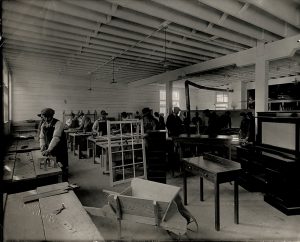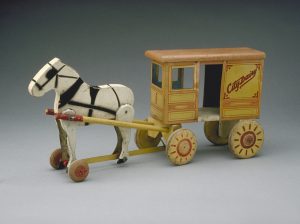Road to Recovery: The Department of Soldiers Re-establishment
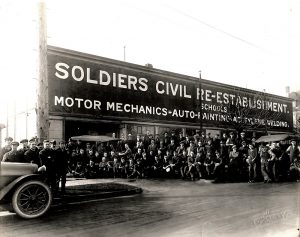
The exterior of the Department of Soldiers’ Civil Re-establishment Workshop in Victoria, BC. c. 1920
The Emerging Department of Soldiers’ Civil Re-establishment.
The injuries of some soldiers were so profound that full recovery was not likely. Such injuries demanded a more dynamic, collective and systematic approach to soldier recovery. This need resulted in the Department of Soldiers’ Civil Re-establishment.
This department provided a combination of medical care and industrial education. It oversaw veterans hospitals as well as technical training schools. Through it, wounded soldiers recovered their health and their full earning power in civil life.
The Canadian Red Cross’s Vetcraft Shops
The Canadian Red Cross also provided aid to returning soldiers who were permanently disabled. Beginning in 1918, the Canadian Red Cross set up Vetcraft Shops. These shops provided a paid work place for wounded soldiers. These shops were in cities from Halifax to Victoria.
Funding Aid Toward Workshops
The Department of Soldiers’ Civil Re-establishment also provided partial funding assistance. This financial aide went to pay rent for workshop space. Through it, workers also acquired equipment and supplies. This funding also provided pay for the work of wounded soldiers
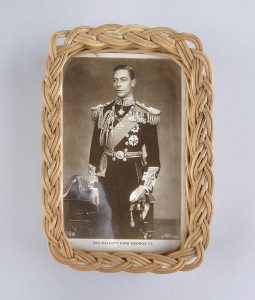
A picture frame made by a disabled Canadian First World War veteran at one of the Vetcraft Workshops. c. 1920s
The Goals of Craft-making Workshops
Recovering and rehabilitated soldiers made made various items in these workshops. They created furniture and wickerwork . They made picture frames, chair caning, washboards, tin and other hammered metal ware.
Sales from these craft-making workshops would help soldiers gain independence. It helped them to become self-supporting and make their own living. The ultimate goal of these workshops was to help soldiers leverage other jobs.
Travelling Salesmen
Travelling salesmen worked to find markets for the products and toys. This was true especially in the period leading up to Christmas. In some locations, special orders became the mainstay of the business. For example, workshops in Saint John, New Brunswick made tens of thousands of shooks. These thin, wooden crosspieces fit into a box to divide delicate contents. The Vancouver workshop specialized in re-upholstered and repaired saloon chairs. These chairs were in use on the Grand Trunk Pacific boats.
The Decline of Vetcraft Shops and Workshops
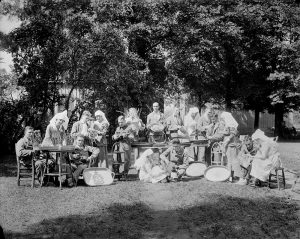
First World War veterans learning handicrafts under the Department of Soldiers’ Civil Re-establishment c. 1918-1919
The Vetcraft Shops and workshops went into a slow decline. The shops set up by the Canadian Red Cross began to close in the late 1920s or early 1930s due to lower sales. The workshop in Winnipeg burned down in June 1930. And, although there were 33 men on the payroll, it was not reopened.
If you would like to see more trench art and other Canadian war-related craft, click here.


